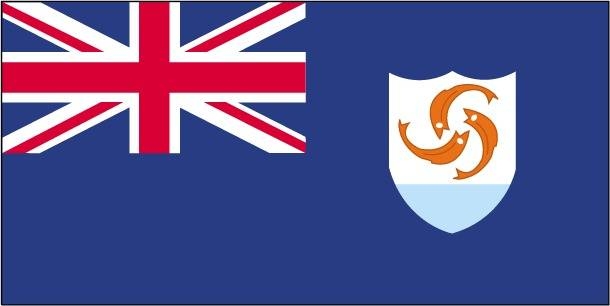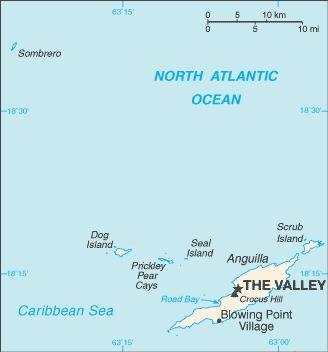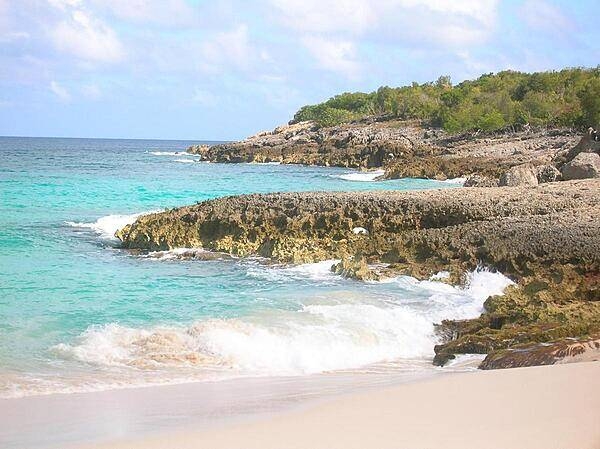115 Anguilla (UK)

Blue, with the flag of the UK in the upper hoist-side quadrant and the Anguillan coat of arms centered in the outer half of the flag. The coat of arms depicts three orange dolphins in an interlocking circular design on a white background with a turquoise-blue field below. The white in the background represents peace. The blue base symbolizes the surrounding sea, as well as faith, youth, and hope. The three dolphins stand for endurance, unity, and strength.
Flag courtesy of the CIA World Factbook

Map courtesy of the CIA World Factbook

Anguilla, one of the Leeward Islands in the Caribbean, is composed of scrub-covered coral and limestone, which can be seen in this photograph of Limestone Bay. The island’s many bays and pristine beaches draw visitors from around the world, making tourism Anguilla’s main industry.
Photo courtesy of the CIA World Factbook
Last updated on March 20, 2025
Government
According to Britannica, executive power is in the hands of a governor appointed by the British monarch. The governor is in charge of external affairs, defense, internal security (including police), and public services. The governor presides over the Executive Council, which comprises a chief minister, other ministers, and ex officio members. The unicameral House of Assembly has 11 seats plus a speaker; seven members are directly elected by universal adult suffrage to five-year terms, two are appointed by the governor after consultation with the chief minister and leader of the opposition, and two are ex officio. Voting is open to individuals age 18 and older. The highest judicial body in Anguilla is the High Court; its judge is provided by the Eastern Caribbean Supreme Court. Final appeals are heard by the Privy Council in Britain. The island has no military; the United Kingdom is responsible for Anguilla’s defense.
Organization of Eastern Caribbean States (OECS)
The Organization of Eastern Caribbean States (OECS) is an eleven-member grouping of islands spread across the Eastern Caribbean. Together, they form a near-continuous archipelago across the eastern reaches of the Caribbean Sea. They comprise the Leeward Islands: Antigua and Barbuda, Saint Kitts and Nevis, Montserrat, Anguilla and the British Virgin Islands; and the Windward Islands: Dominica, Saint Lucia, Saint Vincent and the Grenadines and Grenada, Martinique and Guadeloupe.
Eastern Caribbean Civil Aviation Authority (ECCAA)
The Eastern Caribbean Civil Aviation Authority (ECCAA) evolved from the Directorate of Civil Aviation – Eastern Caribbean States, which may be considered as one of the oldest, if not the oldest institutions in the Eastern Caribbean region. From inception, the Directorate was seen as a vehicle for facilitating a collective and uniform approach to Civil Aviation matters affecting the then Windward and Leeward Islands, which now comprise the OECS Group.
Airspace
SkyVector – Google Maps – ADS-B Exchange
ICAO countries publish an Aeronautical Information Publication (AIP). This document is divided into three parts: General (GEN), En Route (ENR) and Aerodromes (AD). ENR 1.4 details the types of airspace classes they chose to adopt from classes A through G.
Anguilla AIP – fee required
Drone Regulations
ASSI – Legal requirements for the operation of small unmanned aircraft in the UK Overseas Territories
Advanced Air Mobility (AAM) Regulations & Policies
None found by the author.
However, should you, the reader, happen to stumble across something to the contrary, please email the author at FISHE5CA@erau.edu and you may be mentioned in the ACKNOWLEDGEMENTS section of this book by way of thanks for contributing to this free eBook!
Advanced Air Mobility (AAM) News
None found by the author.
However, should you, the reader, happen to stumble across something to the contrary, please email the author at FISHE5CA@erau.edu and you may be mentioned in the ACKNOWLEDGEMENTS section of this book by way of thanks for contributing to this free eBook!
Short Essay Questions
Scenario-Based Question
You have been hired by a Drone Startup Company. Your boss has immediately assigned this job to you.
They need you to prepare a one-page memo detailing the legalities of using a drone to film the beaches in Anguilla, pictured above.
They need you to mention any national laws and local ordinances.
They specifically want to know what airspace (insert pictures) you will be operating in and whether or not you need an airspace authorization.
Does it matter whether or not you are a citizen of the country?
Lastly, there is a bonus for you if, as you scroll through this chapter, you find any typos or broken links!
Short Essay Questions
- What are the drone categories?
- How is registration addressed?
- How is remote ID addressed?
- What are the model aircraft rules?
- What are the commercial drone rules?
- Are there waivers or exemptions to the rules? If so, for what?
- Would you share a link to an interactive airspace map?
- How is BVLOS addressed?
- How can you fly drones at night?
- How can you fly drones over people?
- Where do you find drone NOTAMs?
- What are the rules for drone maintenance?
- What are the rules for an SMS program?
- What are some unique rules not mentioned above?
- What are the C-UAS rules?
- What are the AAM rules?

